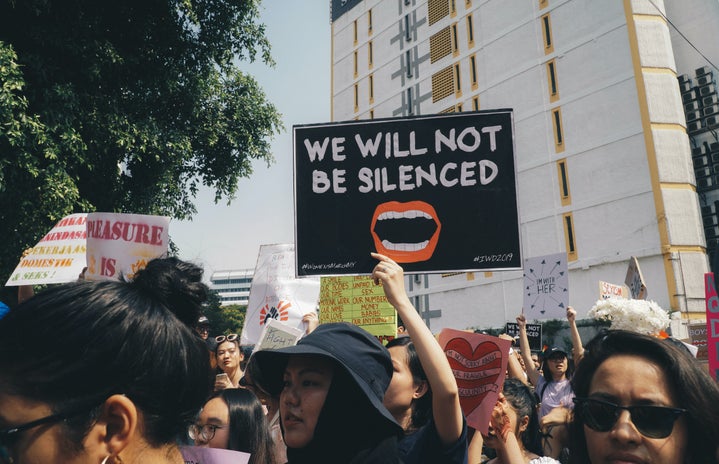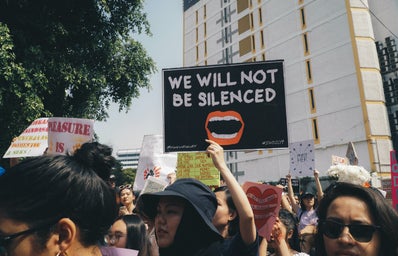Trigger Warning: This article engages with topics regarding sexual assault and suicide. If you are triggered by these topics, please do not read ahead.
April marks the international observation of Sexual Assault Awareness Month. Although the campaign originally had its roots in America, it has grown into a widespread global movement against the normalization of sexualized violence and its prevalent and gut-wrenching effects on our communities, societies, and culture.
The term ‘sexual assault’ refers to any type of sexual contact or behaviour that occurs without explicit consent from the victim. This is usually through acts of coercion or physical force by the perpetrator. It is important to understand that sexual assault can happen to any person in any circumstance regardless of class, race, gender, or sexual orientation. Sexualized violence takes on many forms, but it is ultimately a gross violation of human rights and dignity, with lasting effects and consequences on survivors and communities.
South Africa has the highest rate of sexual assault and rape globally, with our incident rate three times higher than the global average. According to a survey conducted by the South African Medical Research Council, approximately one in four men surveyed admitted to committing acts of sexual assault. Although the Parliament of South Africa has attempted to amend and strengthen all sexual violence laws with the Criminal Law (Sexual Offences and Related Matters) Amendment Act in 2007, the rates of reported rape, sexual abuse of children, and domestic violence have continued to steadily rise.
The experience of sexual assault is never an easy one to recover from. Contrary to popular belief, most cases of sexual assault are likely to be perpetrated by someone the survivor is already acquainted with. This makes it that much harder to deal with cases as survivors may be too afraid to come forward with their truth, not expecting to be believed, with most perpetrators being openly protected by family members and friends. Following an incident of sexual assault, survivors may deal with a range of physical, psychological, and emotional disruptions. It is important that a survivor seek help as soon as possible following any incident of sexual assault. This will help both the survivor and their closest loved ones to deal with the aftermath of the incident, as well as reporting the case to the relevant authorities. Survivors will ordinarily feel a range of strong emotions that may include, but are not limited to, denial, guilt, self-blame, anger, fear, and paranoia. These symptoms may, in most cases, develop into diagnoses of depression, anxiety and post-traumatic stress disorder (PTSD). As a survivor of sexual assault, you may react openly to your experience or control your response, appearing outwardly calm and composed. You may experience a generalized sense of fear or more specific fears depending on the nature of your experience, followed by radical shifts in moods and emotions. You may feel euphoric at having survived such an incident, be unable to concentrate or set your mind to perform specific tasks. You could also be fixated on one constant thought, such as the assault itself, or the fear of encountering your perpetrator again. You may suffer from shakiness, a rapid pulse, hot or cold flushes, sleeping issues, loss of appetite and undergo various medical complaints. You may consider self-harm and suicide. Your sense of self could be shaken or fragmented to such an extent that you suffer the loss of your original identity following the incident. While this list could stretch on indefinitely, it is important to understand that you are not alone in your experience. Although this may be a stark truth, many people have dealt with their own experience of sexualized violence at some point in their own lives. Seeking help, whether from a trusted friend, family member, counsellor or medical practitioner, will make your experience easier to bear in the long run. You are not at fault and you do not have to tough it out alone. Local crisis centres are always available and provide free, confidential counselling services to survivors of sexual assault, no matter how long ago your experience occurred. It is important to understand your sexual assault experience to move towards a healthier future. Starting the healing process early on will diminish the extent of your trauma.
This process of healing differs from survivor to survivor. It is important to remember that there will be days when you may want to give up and simply cave into the emotions you feel, whatever they may be. What you survived may feel like it has consumed you, but it is only one out of a myriad of experiences that have shaped you so far. Through daily acts of self-compassion, connecting to loved ones and regular therapy or counselling, you will steadily grow more capable to deal with the aftermath of the incident. You will learn to identify your triggers, and through healthy coping mechanisms, develop strategies to avoid situations and thoughts that may take you back to the initial experience and feelings you faced. Remember this experience does not define you- you are more than it. Always, you are stronger than you may think or feel.
As a survivor of sexual assault, you may be perceived, or even perceive yourself, as being ‘ruined’ in some sense. You are more likely to be punished by society than your perpetrator is to be held accountable by law enforcement or the government. This is a sad reality, but thanks to the efforts of brave survivors and allies, as well as growing movements such as #AmINext, #MeToo and #TimesUp, we understand why hope and perseverance still exists.
As survivors and allies we need to be increasingly honest with ourselves and each other about the entrenched systems of patriarchy and sexualized violence. We need to be frank in how we address and deal with these shadowy and domineering evils in our society. No matter the time and reason you are entering this global movement against sexualized violence, know your efforts are welcome and sorely needed. It will take a diverse, multigenerational, and global wave of energy and ideas to dismantle this oppressive culture. Through personal truth-telling, courage, patience, educating our younger generation in better ways and a whole lot of hell raising, we can confront and overcome these systems that have caused pain and suffering to far too many lives. A luta continua, vitória é certa. The struggle continues, victory is certain. If you or someone you know has been sexually assaulted or dealing with the aftermath of such an experience, please make use of the following national resources to seek help: MOSAIC Training Service and Healing Centre: 021 397 3291 Rape Crisis Cape Town Trust: 021 684 1180 Marie Stopes South Africa: 080 011 7785 Tear Foundation (free SMS helpline): *134*7355# The South African Depression and Anxiety Group: 080 021 2223 Suicide Crisis Helpline: 0800 12 13 14

